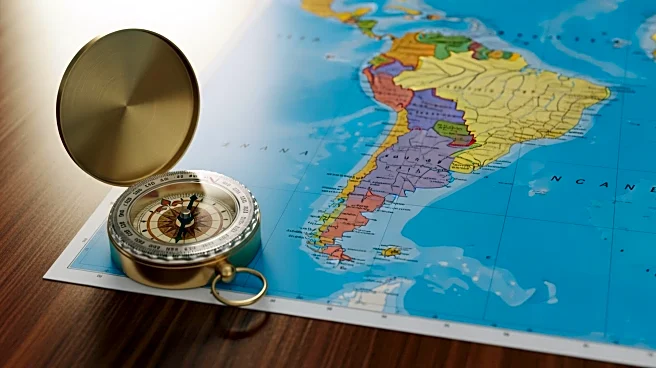What's Happening?
A summit involving European, Latin American, and Caribbean nations commenced in Colombia, aiming to bolster regional ties amid U.S. military operations targeting alleged drug-carrying vessels. The summit, held in Santa Marta, was marked by discussions
on the controversial U.S. strikes, which have resulted in over 60 deaths since September. Colombian President Gustavo Petro criticized the operations as 'extrajudicial executions,' noting the death of a Colombian citizen. The summit's significance was questioned due to the absence of key leaders, attributed to scheduling conflicts with the UN climate summit. Despite this, leaders focused on enhancing trade, digital connectivity, and social development.
Why It's Important?
The summit is pivotal in addressing the impact of U.S. military actions on regional stability and international relations. The strikes have raised ethical and legal concerns, particularly regarding the targeting of impoverished Venezuelan fishermen. The event highlights geopolitical tensions between the U.S. and Latin American countries, especially Venezuela, and underscores the importance of diplomatic dialogue. The summit provides a platform for regional leaders to advocate for peaceful resolutions, potentially influencing U.S. foreign policy and military strategies.
What's Next?
The summit is expected to conclude with a declaration on renewable energy, food security, and technological cooperation, though it remains uncertain if the final statement will address the U.S. strikes. Brazilian President Luiz Inácio Lula da Silva's attendance, despite hosting the COP30 climate conference, indicates regional solidarity with Venezuela. Leaders may continue to push for peaceful conflict resolution and urge the U.S. to reconsider its military approach. The absence of the U.S. at the summit could allow for frank discussions on military deployment and regional security.
Beyond the Headlines
The summit underscores the broader implications of U.S. military actions on international diplomacy and regional alliances. The strikes have sparked debates on human rights and the legality of military interventions, potentially influencing global perceptions of U.S. foreign policy. The event reflects the shifting dynamics in Latin America, where countries are increasingly seeking multilateral solutions and cooperation, challenging traditional power structures.
















